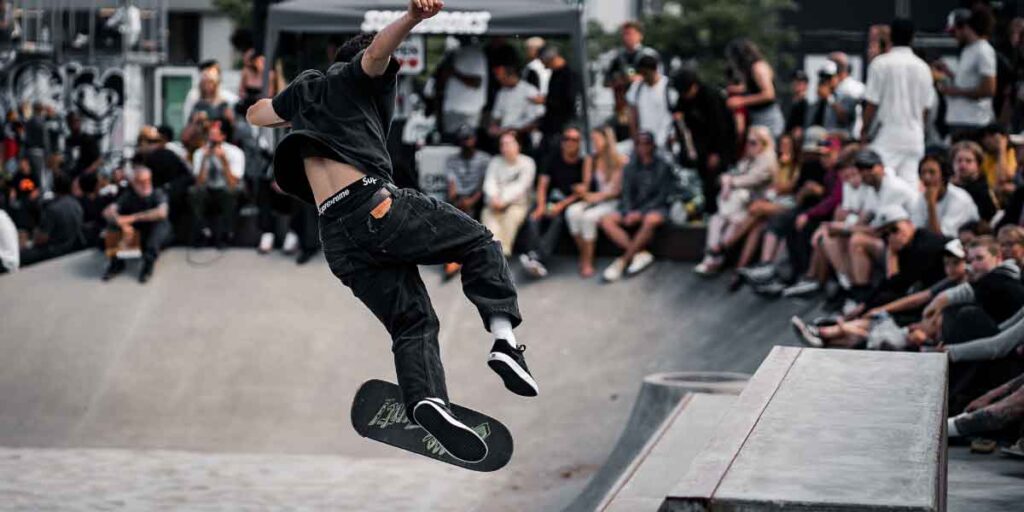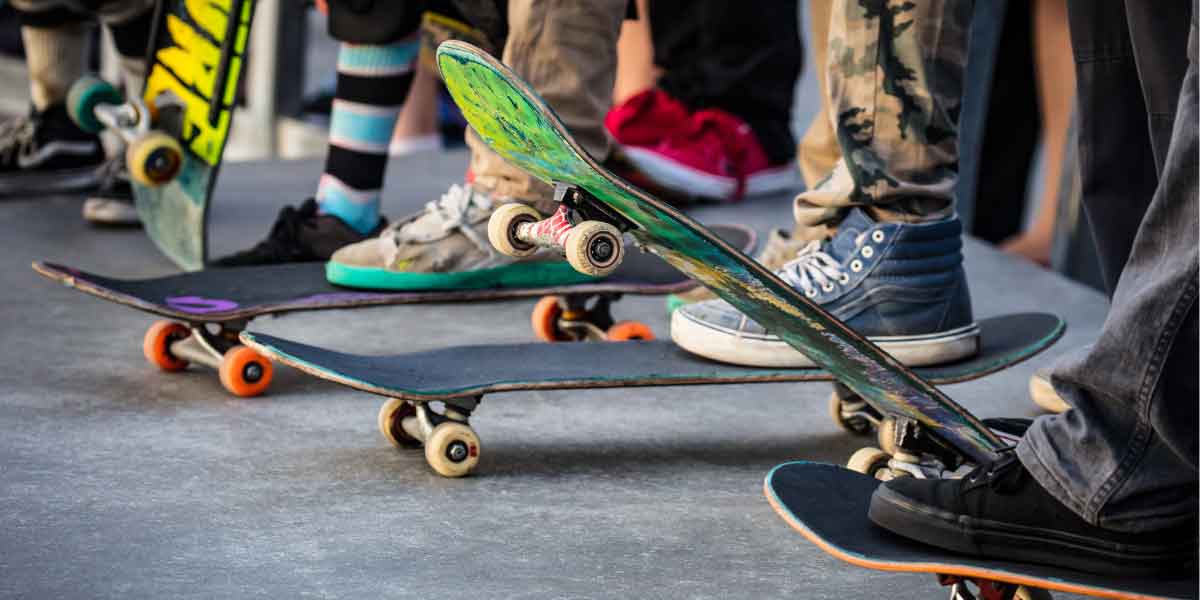Yes, skateboarding is a sport in the Olympics. It debuted at the Tokyo 2020 Games.
Skateboarding made its Olympic debut at the Tokyo 2020 Games. It is a significant milestone for the thrilling sport. This inclusion shows actually how skateboarding is becoming more popular. The competition featured two disciplines: street and park. Skateboarders around the world joined in and showed their creative skills.
This event provided a new platform for skateboarders. It helped to gain recognition and inspire future generations. The Olympic stage elevated skateboarding. It changed from an alternative activity to a popular sport. Fans saw amazing tricks and great performances. Skateboarding’s presence in the Olympics is growing. This promises more exciting competitions in the future.
Introduction To Skateboarding In The Olympics
Skateboarding has long been a beloved activity for many. It combines athletic skill and creativity. The sport has a long history which has developed over many decades. With its inclusion in the Olympics, skateboarding has gained even more recognition. This section explores its journey to the Olympic stage.
History Of Skateboarding
Skateboarding started in the 1940s and early 1950s. It began as a way for surfers to practice on land. California is known as the birthplace of skateboarding. In this way early beginning of skateboarding has happened. Early boards were simple, often made from wooden boxes or planks. Over the years, skateboard designs changed. Now they are more sophisticated with new tricks and styles.
In the 1970s, skateboarding saw a significant boom. The invention of urethane wheels made a big difference. These wheels provide better grip and smoother rides. Skateparks began to pop up in various places. By the 1980s, skateboarding had a strong following. It had its own culture and style, distinct from other sports.
Professional skateboarding emerged in the 1990s. Competitions like the X Games showcased top talent. Skateboarding legends like Tony Hawk became household names. The sport kept growing and became popular worldwide. By the early 2000s, there was a push to include it in the Olympics.
Olympic Inclusion
The journey to the Olympics was not easy. The idea faced resistance from traditional sports communities. The International Olympic Committee (IOC) debated the inclusion of skateboarding for years. In 2016, the IOC made a historic decision. Skateboarding was officially added to the 2020 Tokyo Olympics.
Two disciplines were included: street and park. Street skateboarding involves tricks on stairs, rails, and ledges. Park skateboarding takes place in a bowl-like structure. It allows for high-flying tricks and complex maneuvers. Both formats highlight the skill and creativity of skateboarders.
Skateboarding’s Olympic debut was a milestone. It mainly brought the sport to a global audience. Young skaters from around the world competed. They showcased their talents on the grandest stage. The event was successful in gaining praise from fans.
Skateboarding in the Olympics marks a new era. It highlights the sport’s growth and its universal appeal. The future of skateboarding looks bright, with endless possibilities ahead.

Journey To Olympic Recognition
Skateboarding’s journey to becoming an Olympic sport is a tale of perseverance. It showcases the dedication of skaters and their supporters. This journey spans decades, filled with challenges and triumphs.
Early Advocacy
The push for skateboarding’s Olympic inclusion began in the 1980s. Back then, fans believed the sport deserved global recognition. They also organized events to showcase skateboarding’s athleticism and creativity.
Key figures in the skateboarding community lobbied for its inclusion. They highlighted the sport’s growing popularity and its unique culture. These efforts laid the groundwork for future success.
International Support
Support for skateboarding on the global stage grew in the 1990s. The International Skateboarding Federation (ISF) played an important role. They worked to unify different skateboarding organizations.
Countries started recognizing skateboarding as a legitimate sport. This shift in perception was pivotal. It led to more structured competitions and professional leagues.
The International Olympic Committee (IOC) took notice. They saw the sport’s potential to attract a younger audience. In 2016, the IOC announced skateboarding’s inclusion in the 2020 Tokyo Olympics.
The decision marked a historic moment for the community. It validated years of effort and advocacy. The sport now had a platform to showcase its talents to the world.
Skateboarding Events In The Olympics
Skateboarding made its debut in the 2020 Tokyo Olympics. It featured two main events: Street Skateboarding and Park Skateboarding. Both events brought excitement and energy to the games. They showed the skills and creativity of skateboarders from all over the world.
Street Skateboarding
Street Skateboarding takes place on a course that mimics urban environments. The course includes stairs, rails, curbs, benches, and other elements. Skaters perform tricks and maneuvers on these obstacles.
Judges score skaters based on the difficulty, originality, and execution of their tricks. Each skater has two runs and five trick attempts. The best scores count towards their final result. The skater with the highest score wins.
Park Skateboarding
Park Skateboarding happens in a bowl-like skate park with smooth curves. The park features ramps, bowls, and other transitions. Skaters use the park to perform aerial tricks and complex maneuvers.
Judges look for speed, flow, and the height of tricks. Each skater gets three runs, and the best score counts. Skaters aim to impress with their creativity and skill. The highest-scoring skater takes the gold.
Both events show the diverse and dynamic nature of skateboarding. They highlight the sport’s growing popularity in the Olympic Games.
Rules And Judging Criteria
Skateboarding is an exciting sport in the Olympics. The rules and judging criteria ensure fairness and consistency. Judges look for specific elements to score each performance. This makes the competition thrilling for both participants and viewers.
Scoring System
The scoring system in Olympic skateboarding is detailed. Skaters are judged based on their tricks and overall performance. The score ranges from 0 to 100.
| Category | Points |
| Difficulty | 0-30 |
| Execution | 0-30 |
| Consistency | 0-20 |
| Style | 0-20 |
Difficulty measures how hard the tricks are. Execution looks at how well the tricks are performed. Consistency checks if the skater lands their tricks smoothly. Style evaluates the skater’s unique approach and flair.
Judging Panels
The judging panels consist of experienced professionals. Each panel has five judges. They use the criteria to score each skater’s performance. Judges have a deep understanding of skateboarding.
- Judges score individually.
- Scores are then averaged.
- The final scores determine the winner.
Having multiple judges ensures fairness. Each judge brings their own expertise. This helps balance the scores. The judges follow strict guidelines. They are trained to be impartial and consistent.
Key Athletes In Olympic Skateboarding
Skateboarding made its debut at the Olympics in Tokyo in 2020. The world watched in awe. Athletes from around the globe showcased their skills. Let’s delve into the key athletes in 2020 Olympic skateboarding.
Notable Olympians
Several Olympians have left a mark in the sport. Here are some of the most notable:
- Nyjah Huston: An American skateboarder. Known for his technical tricks. He has won multiple X Games medals.
- Yuto Horigome: A Japanese skateboarder. He won the first Olympic gold in skateboarding. He is famous for his smooth style.
- Leticia Bufoni: A Brazilian skateboarder. She is a five-time X Games gold medalist. Her fearless tricks inspire many.
- Sky Brown: A British skateboarder. At 13, she became the youngest Olympic medalist for Great Britain. Her talent is unmatched for her age.
Rising Stars
The future of Olympic skateboarding looks bright. Several young talents are emerging. Here are a few rising stars:
| Athlete | Country | Notable Achievements |
| Rayssa Leal | Brazil | Won silver at Tokyo 2020. Known as the “Fadinha” (Little Fairy). |
| Jagger Eaton | USA | Won bronze at Tokyo 2020. He is also known for his versatility in skateboarding. |
| Momiji Nishiya | Japan | Won gold in Tokyo in 2020 at age 13. One of the youngest gold medalists. |

Impact On The Skateboarding Community
The inclusion of skateboarding in the Olympics has been a game-changer. This historic move has brought both excitement and mixed feelings within the skateboarding community. Let’s explore the cultural shifts and new opportunities this change has created.
Cultural Shifts
Skateboarding has always been more than just a sport. With its entry into the Olympics, the culture around skateboarding is evolving.
- Increased Visibility: Skateboarding is now in the global spotlight. This has introduced the sport to new audiences.
- Changing Perceptions: It is no longer seen as a rebellious activity. Skateboarding is gaining respect as a legitimate sport.
- Community Growth: The skateboarding community is expanding. More people are picking up skateboards and joining the fun.
New Opportunities
The Olympic inclusion has opened many doors for skateboarders. Here are some changes:
| Opportunity | Details |
| Sponsorships | More skateboarding brands are investing in skates. This provides financial support and resources. |
| Competitions | There are now more skateboarding events. This offers skaters more chances to showcase their skills. |
| Training Facilities | New skate parks and training centers are being built. This gives skaters better places to practice. |
These opportunities are not just for professional skaters. They benefit the entire skateboarding community, from beginners to experts.
Challenges And Controversies
Skateboarding in the Olympics has sparked much debate. Many people argue about its place in the Olympic Games. Here we look at some of the main issues.
Debate Over Professionalism
Some people think skateboarding should stay a street activity because they worry the Olympics might change its culture. Others believe it needs more professional recognition. For that reason, this debate has split the skateboarding community.
| Pros | Cons |
| Brings global recognition | May lose its unique culture |
| Increases funding for athletes | Could become too commercialized |
Injury Concerns
Skateboarding is risky. Athletes can often suffer injuries. The high-speed tricks and stunts can be dangerous. Concerns about safety are valid. And the Olympics require high safety standards.
- Frequent falls
- Broken bones
- Head injuries
Safety gear is essential. Helmets, knee pads, and elbow pads can help. The Olympics must enforce these rules strictly.
Future Of Skateboarding In The Olympics
The inclusion of skateboarding in the Olympics has excited many fans. This new addition has opened doors for skateboarders worldwide. What does the future hold for this thrilling sport?
Potential Changes
Changes are always a part of any sport’s growth. For skateboarding, we might see new events added. These could include:
- Street
- Park
- Vert
In the future, rules and judging criteria might evolve. More refined guidelines could ensure fairer competition.
Long-term Prospects
Skateboarding has a bright future in the Olympics. The sport can inspire many young athletes. Skateboarding can become a staple in Olympic programs.
Here are some long-term prospects:
- More countries participating
- Improvement in training facilities
- Rising popularity and media coverage
With these prospects, skateboarding can grow in leaps and bounds. This will ensure its lasting presence in the Olympic Games.
Frequently Asked Questions
Is Skateboarding Going To Be An Olympic Sport?
Yes, skateboarding is an Olympic sport. It debuted at the Tokyo 2020 Olympics and will feature in future games.
What Are The 5 New Sports For The 2024 Olympics?
The 2024 Olympics will feature five new sports: breaking, sport climbing, skateboarding, surfing, and karate. These additions aim to attract younger audiences and show global interest. Including these sports highlights how the Olympics are changing.
Is Skateboarding Classified As A Sport?
Yes, skateboarding is classified as a sport. It requires physical skill, agility, and practice. Skateboarding was included in the Olympics.
When Did Skateboarding Become An Olympic Sport?
Skateboarding became an Olympic sport in 2021. It made its debut at the Tokyo Summer Olympics.
Conclusion
Skateboarding’s inclusion in the Olympics marks a significant milestone. It brings global recognition to the sport and its athletes. The dynamic energy and creativity of skateboarding now have a prestigious platform.
This boosts its popularity and inspires future generations. Embrace the evolution of sports with skateboarding in the Olympics. We hope you have got your answer to whether is skateboarding a sport in the Olympics. Thanks for reading the blog. Stay with skating.

